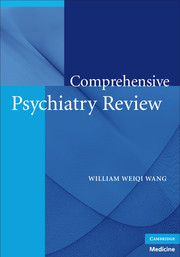Book contents
- Frontmatter
- Contents
- Introduction
- PART I INTELLECTUAL FOUNDATION OF PSYCHIATRY
- PART II EVALUATION AND MEASUREMENT
- PART III PSYCHIATRIC DISORDERS
- 10 Cognitive Disorders
- 11 Addictions: General Consideration
- 12 Addictions: Alcohol-Related Disorders
- 13 Addictions: Nonalcoholic Substance-Related Disorders
- 14 Psychotic Disorders
- 15 Mood Disorders
- 16 Anxiety Disorders
- 17 Somatoform Disorders
- 18 Dissociative Disorders
- 19 Sexual and Gender Identity Disorders
- 20 Eating Disorders and Weight Issues
- 21 Sleep Disorders
- 22 Factitious Disorders and Malingering
- 23 Personality Disorders
- 24 Child and Adolescent Psychiatric Disorders
- 25 Psychosomatic Disorders and Consultation-Liaison Psychiatry
- PART IV PSYCHIATRIC THERAPEUTICS
- PART V NEUROPSYCHIATRY AND RELEVANT NEUROLOGIC CONDITIONS
- PART VI SPECIAL TOPICS
- PART VII REVIEW QUESTIONS
- Bibliography
- Index
15 - Mood Disorders
from PART III - PSYCHIATRIC DISORDERS
Published online by Cambridge University Press: 18 January 2010
- Frontmatter
- Contents
- Introduction
- PART I INTELLECTUAL FOUNDATION OF PSYCHIATRY
- PART II EVALUATION AND MEASUREMENT
- PART III PSYCHIATRIC DISORDERS
- 10 Cognitive Disorders
- 11 Addictions: General Consideration
- 12 Addictions: Alcohol-Related Disorders
- 13 Addictions: Nonalcoholic Substance-Related Disorders
- 14 Psychotic Disorders
- 15 Mood Disorders
- 16 Anxiety Disorders
- 17 Somatoform Disorders
- 18 Dissociative Disorders
- 19 Sexual and Gender Identity Disorders
- 20 Eating Disorders and Weight Issues
- 21 Sleep Disorders
- 22 Factitious Disorders and Malingering
- 23 Personality Disorders
- 24 Child and Adolescent Psychiatric Disorders
- 25 Psychosomatic Disorders and Consultation-Liaison Psychiatry
- PART IV PSYCHIATRIC THERAPEUTICS
- PART V NEUROPSYCHIATRY AND RELEVANT NEUROLOGIC CONDITIONS
- PART VI SPECIAL TOPICS
- PART VII REVIEW QUESTIONS
- Bibliography
- Index
Summary
In his ground-breaking work that set the foundation of scientific psychiatry, Emil Kraepelin grouped mental diseases based on classification of not only common symptoms but also longitudinal courses. He divided insanity or psychosis into two major categories: dementia precox and manic-depression. The latter, as seen today as the combination of all mood disorders, is characterized by prominent mood symptoms, and relatively normal period between symptomatic episodes. Psychotic symptoms may appear during episodes of mood disturbance; however, it should not be the dominating feature and should not appear during periods of normal mood.
This group of diseases was previously called “affective disorders.” The term “mood disorders,” however, is preferred today. “Mood disorders” refers to disturbance in sustained emotional states rather than external expression of the present emotional state. The DSM-IV-TR provides definition of four types of mood episodes: major depressive episode, manic episode, hypomanic episode, and mixed episode. On the basis of the combination of episodes, longitudinal courses, and the severity of functioning impairment, DSM-IV-TR categorized 10 mood disorders
▶ Major depressive disorder
▶ Dysthymic disorder
▶ Depressive disorder not otherwise specified (NOS)
▶ Bipolar I disorder
▶ Bipolar II disorder
▶ Cyclothymic disorder
▶ Bipolar disorder NOS
▶ Mood disorder due to general medical condition
▶ Substance-induced mood disorder
▶ Mood disorder NOS
The etiology of mood disorders is a complex interplay of multiple factors. Current research has led to the assumption of the existence of an inherited predisposition or susceptibility to the disease. It is associated with functional disturbance in several neurotransmitter systems, in particular, the norepinephrine, serotonin, dopamine, and gamma-amino butyric acid (GABA) systems.
- Type
- Chapter
- Information
- Comprehensive Psychiatry Review , pp. 110 - 118Publisher: Cambridge University PressPrint publication year: 2009



